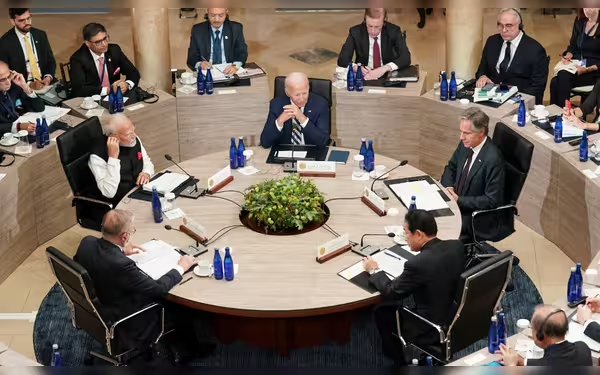Saturday, November 16, 2024 08:47 PM
Quad Leaders Strengthen Maritime Security Cooperation at Biden's Summit
- Quad expands maritime security in Indo-Pacific region.
- Joint coast guard operations discussed among member nations.
- Health initiatives also addressed alongside security matters.
 Image Credits: arabnewspk
Image Credits: arabnewspkQuad leaders enhance maritime security cooperation at Biden's farewell summit, addressing regional stability and health initiatives.
In a significant development for maritime security in the Indo-Pacific region, leaders from Australia, India, Japan, and the United States convened for a crucial summit hosted by outgoing US President Joe Biden. This meeting, held in Claymont, Delaware, marks a pivotal moment for the Quad grouping, which was established to address shared concerns regarding China's growing influence in the region.
During the summit, Biden welcomed Australian Prime Minister Anthony Albanese, Indian Prime Minister Narendra Modi, and Japanese Prime Minister Fumio Kishida. The primary focus of their discussions was to enhance security cooperation in the Indian Ocean, an area of increasing strategic importance. The leaders are set to expand the Indo-Pacific Partnership for Maritime Domain Awareness, which was initiated two years ago, to include the Indian Ocean region, according to senior officials from the Biden administration.
One of the key initiatives discussed was the implementation of joint coast guard operations. This collaboration will involve personnel from Australia, Japan, and India working alongside US coast guard members. Additionally, the countries plan to bolster military logistics cooperation, further solidifying their commitment to regional security.
While the White House emphasized that the Quad summit was not aimed at any specific country, Biden opened the session with a briefing on China. He noted that China is shifting its tactics but not its overall strategy, continuing to challenge the United States in critical maritime areas such as the South China Sea, East China Sea, and the Taiwan Strait. Biden remarked, "We believe (Chinese leader) Xi Jinping is looking to focus on domestic economic challenges and minimize the turbulence in China diplomatic relationships." This statement underscores the ongoing complexities in US-China relations.
China's claims over vast portions of the South China Sea, which overlap with the exclusive economic zones of several Southeast Asian nations, have raised significant concerns. Beijing's assertion of territorial rights in the East China Sea, contested by Japan and Taiwan, further complicates the geopolitical landscape. Xi Jinping has expressed strong objections to the Quad, perceiving it as an attempt to encircle China and escalate tensions.
Analysts suggest that the new maritime security initiatives introduced during the summit send a clear message to Beijing, reflecting the Quad's growing focus on security issues amid rising concerns about China's intentions. The leaders also discussed providing critical technologies, including a new open radio access network, to the Pacific Islands and Southeast Asia, regions that are increasingly becoming battlegrounds for influence between the US and China.
In addition to security matters, the leaders addressed health initiatives aimed at combating cervical cancer, showcasing a multifaceted approach to cooperation. Lisa Curtis, an Asia policy expert, noted that India, which traditionally has not aligned itself with military alliances, may be reevaluating its stance on Quad security cooperation due to China's recent maritime assertiveness.
As Biden prepares to leave office following the upcoming US presidential election, his hosting of the Quad summit is seen as an effort to institutionalize the group. This move aims to ensure the Quad's continued relevance and effectiveness in addressing regional challenges. Modi's presence at the summit further emphasizes the group's commitment to long-term collaboration.
The Quad's expansion of maritime security cooperation represents a significant step towards enhancing stability in the Indo-Pacific region. As global dynamics continue to evolve, the collaboration among these four nations will be crucial in addressing emerging challenges and ensuring a secure maritime environment. The commitment to joint operations and technological advancements reflects a proactive approach to safeguarding regional interests, ultimately benefiting not only the Quad nations but also the broader international community.













